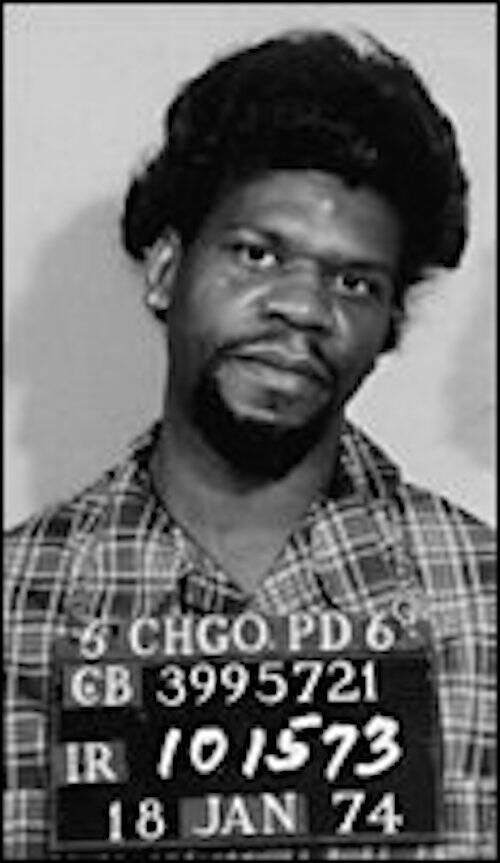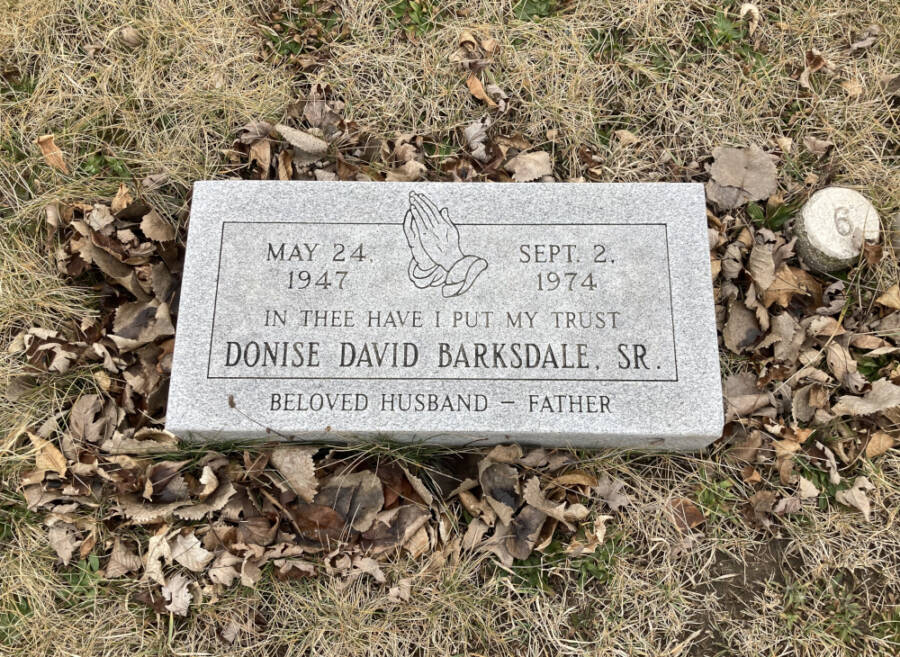Once a feared gang leader, “King David” Barksdale eventually pivoted to anti-violence activism and became an influential force in the American civil rights movement.

FlickrDavid Barksdale in the late 1960s.
Among the most influential figures in Chicago’s gang history, David Barksdale founded the Black Disciples, a notorious street gang, when he was just a teenager. Over time, he gained his own reputation on Chicago’s South Side as a strong and feared leader. In fact, some said that his presence was so imposing that just looking at him could send shivers up your spine.
But although Barksdale started out leading a gang entrenched in violent disputes with other gangs, he eventually realized that the violence was endangering Chicago’s Black communities — so he pivoted to anti-violence activism, using his ability to connect with people to form alliances with other local gangs in an attempt to stem the violence.
Until his untimely death in 1974, Barksdale led the Black Disciples Nation to be a leading force in both Chicago neighborhoods and in the civil rights movement that swept the United States in the late 1960s, channeling his gang’s resources to help improve the lives of Chicago’s Black communities.
This is the story of David Barksdale, the revered “King David” of Chicago.
The Early Life Of David Barksdale

Wikimedia CommonsDavid Barksdale, the Chicago gang leader who pivoted to anti-violence activism.
David Barksdale was born Donise David Barksdale in Sallis, Mississippi on May 24, 1947. His parents, Virginia and Charlie Barksdale, were sharecroppers. David was one of thirteen children.
In 1957, the Barksdale family decided to move to Chicago.
“Their story was very similar to most African Americans who eventually migrate to the north,” Lance Williams, who wrote about David Barksdale in his book King David and Boss Daley, told WBEZ. “His father was chased away because of a conflict that he had with a white man in Sallis, Miss., had to leave under the threat of losing his life, ended up in Chicago and then eventually saved up enough money to bring his family to Chicago.”
According to South Side Weekly, Barksdale experienced a rough and impoverished childhood. Displaced to Englewood on the city’s South Side during Chicago’s “urban renewal projects,” which served to segregate the city’s Black and white populations, Barksdale soon became caught up in gang life by the age of 13.
At 14 years old, Barksdale was kicked out of his house by his father for being disobedient. During his time away from home, Barksdale became further involved with Chicago’s street gangs.
Meanwhile, as the number of impoverished Black people in the neighborhood grew, so did police presence there. Barksdale was reportedly targeted by the Chicago Police Department and arrested multiple times, though he was never charged with a felony.
In response to a growing number of racially motivated attacks in the area, and realizing that white politicians were not going to intervene on their behalf, Barksdale and his friends formed a neighborhood group called the 65th Street Boys to defend themselves from white gangs.
Then, in 1963, he formed the more organized “Devil’s Disciples,” a local street gang composed of 13 to 17-year-olds that soon became caught up in gang wars with not only white gangs, but rival Black gangs as well.
Later, as the Devil’s Disciples gained more power, they would become known as the Black Disciples.
How A Brush With Death Changed David Barksdale’s Life
By the late 1960s, David Barksdale had made a name for himself in Chicago as a feared gangster. Often, Barksdale would lead his gang in violent struggles against the Black Stone Rangers and other rival gangs to bolster the Disciples’ reputation on the street.
Unfortunately, Barksdale’s fearsome reputation also led to attempts on his life. And eventually, one close brush with death would completely alter the course of his life story.
In 1968, Barksdale was exiting a bar in Chicago when he was shot six times by a group of teenagers affiliated with the Black Stone Rangers.
Miraculously, Barksdale survived the shooting, though the wounds he suffered would never completely heal.
This near-death experience impacted him in another profound way. It opened his eyes to the impact gang violence was having on the Black population in Chicago. From that point on, he concentrated his efforts, not into fighting in gang wars, but into fighting against gang violence to protect his community.
The Short But Impactful Life Of David Barksdale
David Barksdale swiftly began to make truces with rival gangs, including the Black Gangster Nation, which was led by the infamous Larry Hoover. Together, the two leaders merged their groups into the “Black Gangster Disciple Nation.” They also attempted to add the Rangers to their alliance, but with very little success.
Meanwhile, Barksdale continued to look for new ways to channel the strength of his street gang, this time looking towards activism.
It was during this time that Barksdale came to be revered as “King David” for his efforts to use the Disciples’ power to advocate for his community. The gang soon started to use its resources to provide community services, like health clinics and free meal programs for youth in Englewood.
According to Chicago Gang History, in the early 1970s, Barksdale would even sometimes go to schools in the South Shore neighborhood and throw stacks of $1 bills to the children in the school yard.
Barksdale also made it his mission to make connections with the Black Panther Party, and until his death he maintained a close relationship with Fred Hampton, the party’s Illinois chairman, helping to organize protests against police brutality and racial discrimination.
Tragically, however, Barksdale eventually succumbed to the very violence that he fought against. On Sept. 2, 1974, at the age of just 27, Barksdale died of kidney failure — an ailment stemming from the injuries he sustained during the 1968 attempt on his life.

Wikimedia CommonsThough David Barksdale survived an assassination attempt in 1968, he would die of complications from his gunshot wounds years later.
The Current State Of The Black Disciples
Following David Barksdale’s death, the Black Disciples fell into a period of chaos. Barksdale had been the main force maintaining the peace between the unified gangs of the Black Gangster Disciple Nation, and once he was gone, old rivalries and power struggles sprang up again unchecked.
The group split into two main factions: the Black Disciples and the Gangster Disciples
This division led to waves of intense violence until Black Disciple member Mickey Bull took control in the 1980s and unified the factions, declaring that they were all just “Black Disciples” and temporarily ceasing the violence.
However, in 1991, Bull was murdered by Gangster Disciples members, sparking another war between the factions. The division between the groups persists to this day.
Today, the Black Disciples boast a membership of anywhere from 9,000 to 12,000 members, according to research from the National Gang Crime Research Center.
But while the group has faced its challenges and controversies in the years since David Barksdale’s death, it never forgot its founder: Every May, on Barksdale’s birthday, the Disciples reportedly throw a massive picnic party in his honor on Chicago’s South Side.
After reading about the life and legacy of David Barksdale, discover the story of Larry Hoover, founder of the Gangster Disciples in Chicago. Then, discover the story of the Bloods, an infamous gang that began in Los Angeles and quickly spread from coast to coast.





